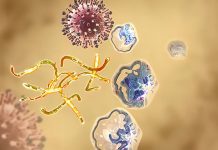
A new study found that the potential use of the IgG glycome composition could act as an early sign of perimenopause.
Perimenopause is the stage where hormone levels start to change, but before women’s periods stop completely. The study found an early biological sign of perimenopause; more physical signs include hot flushes, weight gain and dizziness. Treatments for perimenopause include hormone replacement therapy, vaginal estrogen, antidepressants, and gabapentin.
Researchers from the Genos Glycoscience Research Laboratory in Zagreb, Croatia, Newson Health Menopause & Wellbeing in Stratford upon Avon and King’s College London, followed nearly 2000 women for 15 years and analysed their IgG glycans multiple times during that period. IgG glycans, also known as immunoglobulin G glycome, is an antibody and acts as a biomarker of an individual’s health.
The study was published today in iScience.
A new sign of perimenopause
Researchers analysed IgG glycome composition in 5,080 samples from 1,940 females during their transition from before menopause (pre-menopause) to post-menopause. The samples were collated mostly from TwinsUK which is the largest twin registry in the UK and led by researchers from King’s College London.
Analysis of the IgG glycome in multiple samples from the same individuals was able to show the association between perimenopause and the changes in the IgG glycome composition. This period showed the IgG glycome changing from an inflammation-suppressive to proinflammatory. Whilst this is common as we age, researchers observed this change occur rapidly as women transitioned from a regular cycle to menopause. This suggests that the changes in IgG glycome could be an early sign of perimenopause.
This rapid change in IgG glycans is associated with many health risks that accompany menopause. In some diseases like rheumatoid arthritis and cardiovascular diseases, this change can occur years before disease onset. This suggests a link between glycans and chronic inflammation, and the transformation of IgG glycans plays a part in developing disease.
No accurate diagnostic test for perimenopause
Perimenopause can last up to 15 years and is challenging to diagnose due to highly irregular hormonal cycles. As a result of poor awareness and inappropriate use of hormonal tests, women are often misdiagnosed with conditions such as fibromyalgia, migraines, depression, or chronic fatigue syndrome, and are frequently prescribed antidepressants despite the lack of evidence to support their use to improve the low mood associated with perimenopause or menopause. This study indicates that it may be possible to use IgG glycans as an early sign of perimenopause and predict the occurrence of the condition.
Dr Cristina Menni, from TwinsUK and King’s College London, said: “Perimenopause is poorly diagnosed due to highly irregular hormonal cycles and symptoms that can last for as long as 15 years. Currently, there is no accurate diagnostic test for perimenopause. Adding an easily quantifiable novel early biomarker of perimenopause could be a valuable improvement to current clinical praxis.”
























